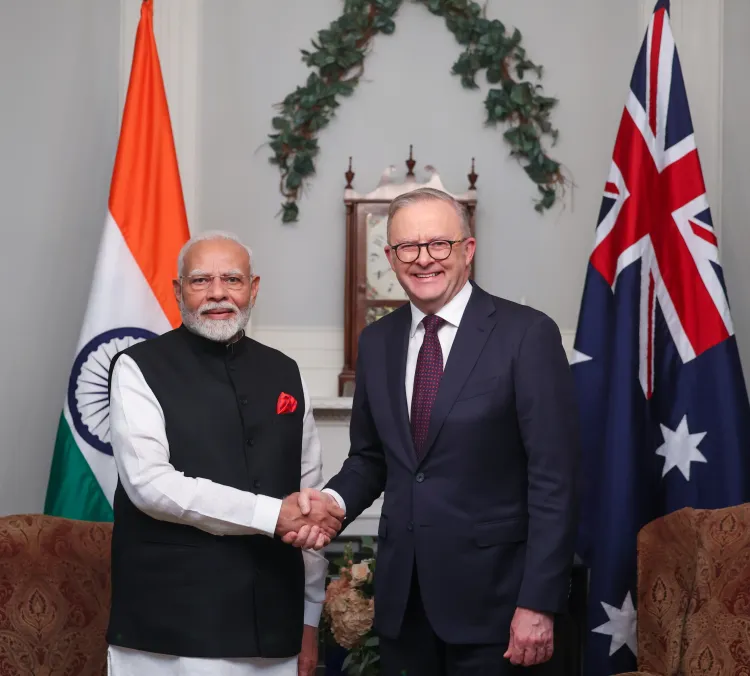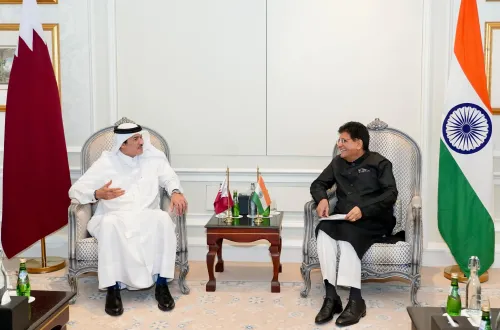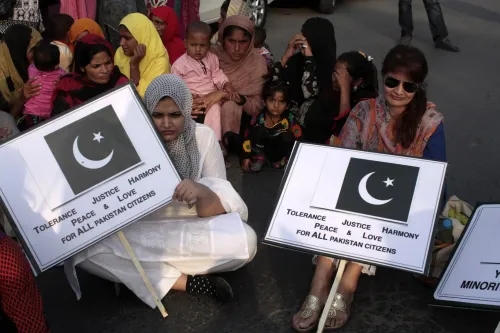Is the relationship between Australia and India at an all-time high?

Synopsis
Key Takeaways
- Australia and India share a historic relationship.
- Albanese's victory strengthens bilateral ties.
- Commitment to Comprehensive Strategic Partnership emphasized.
- Potential for collaboration in various sectors.
- Importance of the Indian diaspora in strengthening ties.
Canberra, May 6 (NationPress) Australian Prime Minister Anthony Albanese stated on Tuesday that the ties between Australia and India are at an all-time high. He expressed his eagerness to collaborate with Prime Minister Narendra Modi in the upcoming years to foster a thriving future for the region.
Earlier in the day, PM Modi reached out to Albanese, offering congratulations on his party's substantial victory in Saturday's General Election.
"I appreciate the call, Prime Minister Narendra Modi, and your kind congratulations. The relationship between Australia and India has never been stronger. I look forward to collaborating with you in the years to come to create a prosperous future for our region," Albanese stated in a post on X.
During their phone conversation, PM Modi congratulated Albanese on his historic re-election as the 32nd Prime Minister of Australia.
"I spoke with my friend Anthony Albanese to personally congratulate him on his party's historic win. We agreed to work together with renewed vigor to enhance the India-Australia Comprehensive Strategic Partnership and explore new avenues for cooperation," PM Modi shared on X following the call.
According to the Ministry of External Affairs (MEA), both Prime Ministers reiterated their commitment to fortifying the Comprehensive Strategic Partnership (CSP) between their nations. They acknowledged that over the past five years, the CSP has fostered strong cooperation across various sectors. They also highlighted the significant role played by the vibrant Indian-origin diaspora in solidifying bilateral relations.
The leaders exchanged insights on regional and global issues of shared interest and reaffirmed their dedication to collaborating in promoting a free, open, stable, rules-based, and prosperous Indo-Pacific.
"The Prime Minister invited PM Albanese to visit India for the Annual Summit and the QUAD Summit, which will be hosted in India later this year. The leaders agreed to maintain communication," the MEA stated.
PM Modi also congratulated Albanese on Saturday immediately after Labor's decisive victory, which saw the party secure 92 lower house seats, marking only the third occasion in Australian history that a party has won over 90 seats.
"Congratulations, Anthony Albanese, on your remarkable victory and re-election as Prime Minister of Australia! This decisive mandate reflects the enduring trust of the Australian people in your leadership. I look forward to working together to further deepen the India-Australia Comprehensive Strategic Partnership and pursue our shared vision for peace, stability, and prosperity in the Indo-Pacific," PM Modi wrote on X.
Albanese, who also engaged in discussions with US President Donald Trump, primarily focusing on tariffs, announced that his first overseas trip during his second term as Prime Minister would be to Indonesia.
Last November, Prime Minister Modi and his Australian counterpart met on the sidelines of the Group of 20 (G20) Summit in Rio de Janeiro, where they also conducted the second Australia-India Annual Summit in anticipation of the fifth anniversary of the Australia-India Comprehensive Strategic Partnership in 2025.
Both Prime Ministers noted the significant advancements made in strengthening bilateral ties across key sectors, including climate change and renewable energy, trade and investment, defense and security, education and research, skills, mobility, science and technology, regional and multilateral cooperation, community and cultural connections, and people-to-people relationships.
They reaffirmed their commitment to enhancing cooperation and reflected on shared interests in the region, expressing satisfaction that closer bilateral engagement has benefited both nations and the broader region.
Both leaders underscored that ‘Make in India’ and ‘Future Made in Australia’ possess complementary and collaborative potential, which could create new jobs, stimulate economic growth, and secure future prosperity in a changing world.
India and Australia are also part of the Quad grouping, along with the United States and Japan.









